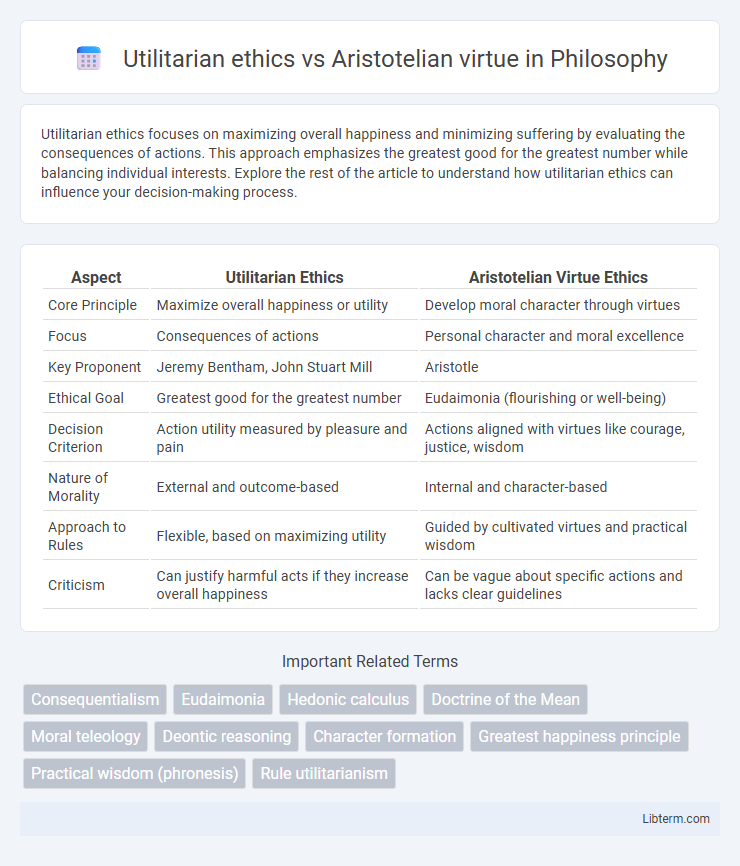Utilitarian ethics focuses on maximizing overall happiness and minimizing suffering by evaluating the consequences of actions. This approach emphasizes the greatest good for the greatest number while balancing individual interests. Explore the rest of the article to understand how utilitarian ethics can influence your decision-making process.
Table of Comparison
| Aspect | Utilitarian Ethics | Aristotelian Virtue Ethics |
|---|---|---|
| Core Principle | Maximize overall happiness or utility | Develop moral character through virtues |
| Focus | Consequences of actions | Personal character and moral excellence |
| Key Proponent | Jeremy Bentham, John Stuart Mill | Aristotle |
| Ethical Goal | Greatest good for the greatest number | Eudaimonia (flourishing or well-being) |
| Decision Criterion | Action utility measured by pleasure and pain | Actions aligned with virtues like courage, justice, wisdom |
| Nature of Morality | External and outcome-based | Internal and character-based |
| Approach to Rules | Flexible, based on maximizing utility | Guided by cultivated virtues and practical wisdom |
| Criticism | Can justify harmful acts if they increase overall happiness | Can be vague about specific actions and lacks clear guidelines |
Introduction to Utilitarian Ethics and Aristotelian Virtue
Utilitarian ethics centers on maximizing overall happiness and minimizing suffering, emphasizing the consequences of actions as the primary measure of morality. Aristotelian virtue ethics focuses on cultivating character traits or virtues, such as courage and temperance, that enable individuals to achieve eudaimonia, or human flourishing. Both frameworks offer distinct approaches: utilitarianism prioritizes outcomes and collective well-being, while Aristotelian virtue ethics prioritizes moral character and the development of practical wisdom.
Core Principles of Utilitarianism
Utilitarian ethics centers on maximizing overall happiness and minimizing suffering, guided by the principle of the greatest good for the greatest number. It evaluates moral actions based on their consequences, often quantified through measures of pleasure and pain. In contrast, Aristotelian virtue ethics emphasizes the development of moral character and virtues as the path to eudaimonia, or human flourishing.
Fundamental Tenets of Aristotelian Virtue Ethics
Aristotelian virtue ethics centers on developing character traits like courage, temperance, and wisdom, emphasizing moral virtues as habits cultivated through practice. It asserts that ethical behavior arises from achieving eudaimonia, or human flourishing, by fulfilling one's rational nature and purpose. Unlike utilitarian ethics, which prioritizes the greatest good for the greatest number, Aristotelian ethics values individual moral development and the cultivation of virtues as the foundation for ethical living.
Approaches to Moral Decision-Making
Utilitarian ethics evaluates moral decisions based on the consequences, aiming to maximize overall happiness or utility for the greatest number. Aristotelian virtue ethics emphasizes cultivating character traits and moral virtues, guiding decisions by what a virtuous person would do in a given situation. Utilitarianism relies on outcome measurement, while Aristotelian ethics prioritizes the development of moral character and practical wisdom (phronesis).
The Role of Consequences vs. Character
Utilitarian ethics prioritizes the consequences of actions, evaluating morality based on the greatest good or happiness produced for the majority, emphasizing outcome-based decision making. Aristotelian virtue ethics centers on the development of moral character and virtues, asserting that ethical behavior arises from cultivating traits like courage, temperance, and wisdom. The contrast lies in utilitarianism's outcome-driven framework versus Aristotelianism's focus on intrinsic character growth influencing ethical decisions.
Happiness: Greatest Good or Flourishing Life?
Utilitarian ethics defines happiness as the greatest good achieved by maximizing overall pleasure and minimizing pain for the majority, emphasizing consequentialist outcomes. Aristotelian virtue ethics views happiness as eudaimonia, or flourishing, attained through virtuous character development and fulfilling one's potential within a well-ordered life. These two frameworks contrast collective utility with individual moral excellence as the basis of a meaningful and happy life.
Moral Dilemmas and Practical Examples
Utilitarian ethics evaluates moral dilemmas by measuring actions against their outcomes, emphasizing the greatest happiness for the greatest number, such as choosing to sacrifice one life to save many in a trolley problem scenario. Aristotelian virtue ethics addresses moral challenges by focusing on cultivating character traits like courage and temperance, encouraging individuals to act according to reason and seek a balanced, virtuous mean in situations such as navigating professional integrity versus personal benefit. In practice, utilitarianism prioritizes consequences to resolve ethical conflicts, while Aristotelian ethics stresses character development and moral wisdom to guide decision-making in complex real-life dilemmas.
Critiques and Limitations of Utilitarianism
Utilitarianism faces significant critiques for its emphasis on maximizing overall happiness, often neglecting individual rights and justice, which can lead to morally questionable decisions. Critics argue that this ethical framework oversimplifies complex human experiences by reducing moral value solely to pleasure or pain, ignoring virtues like courage, honesty, and integrity emphasized in Aristotelian ethics. Moreover, utilitarianism's difficulty in accurately predicting consequences challenges its practical application, contrasting with Aristotle's focus on character development and moral wisdom for ethical living.
Challenges Faced by Virtue Ethics
Virtue ethics faces challenges in providing clear guidance for moral dilemmas compared to utilitarian ethics, which uses outcome-based calculations for decision-making. The subjective nature of defining and prioritizing virtues makes it difficult to apply universally across diverse cultures and situations. Furthermore, virtue ethics lacks a systematic procedure for resolving conflicts between competing virtues, complicating practical ethical judgments.
Reconciling or Contrasting the Two Ethical Theories
Utilitarian ethics assesses morality based on the consequences of actions, emphasizing the greatest happiness for the greatest number, while Aristotelian virtue ethics centers on developing moral character and achieving eudaimonia through virtuous habits. Reconciling these theories involves integrating utilitarian focus on outcomes with Aristotelian emphasis on character, suggesting that cultivating virtues can lead to decisions that maximize overall well-being. Contrasting them highlights utilitarianism's consequence-driven framework versus virtue ethics' intrinsic value placed on moral character and personal flourishing.
Utilitarian ethics Infographic

 libterm.com
libterm.com